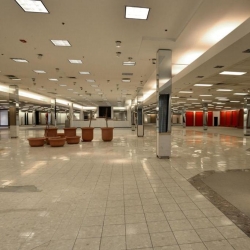
Senate Bill 1126 would allow cities to hold votes to approve casinos. One plan would turn a closed Bristol mall into Bristol Resort & Casino.
The Virginia Senate voted 28-12 to approve Senate Bill 1126, which opens the door to land-based casinos in the commonwealth. SB 1126 allows casino referenda to be held to legalize casino projects, though the local ballot initiatives will not take place until in 2020.
The vote is good news for developers of the potential Bristol Resort & Casino. The potential owners want to convert the closed Bristol Mall into a casino operation in what they say could have a “transformative” impact on the city and region’s economy.
The Bristol Casino’s developers say their resort would create 2,000 permanent jobs in its first two years of operation, but the total jobs would increase to 5,200 in its seventh year of operations.
The average salary of Bristol Casino jobs would be $46,000 a year, which would allow for a total of over $200 million a year pumped into the local and state economy. The developers estimate that 4 million people would visit the property in Southwest Virginia each year, eventually bringing in $4.5 billion to the region in its first 5 years of operation.
House of Delegates Must Approve SB1126
Of course, Monday’s vote in the Virginia Senate does not assure such a bill becomes law. The Virginia House of Delegates would have to approve the bill, then the commonwealth’s governor would have to sign the bill into law.
If that happened, then SB 1126 authorized the creation of the Joint Legislative Audit and Review Commission. The commission would investigate the feasibility of Bristol Casino and test its backers’ statistical projections, then report back to the Senate and House by November 1, 2019.
The Bristol Casino’s proponents argue that Virginia loses hundreds of millions of dollars in tax revenue every year by delaying a project. Their justification goes: “A resort casino in Bristol is projected to draw 80% of its guests from out of state, bringing a revenue stream to the Commonwealth which currently does not exist.”
“Virginia continues to lose sales and tax revenues to surrounding states (North Carolina, West Virginia and Maryland) by the hundreds of millions of dollars. One hundred percent of Virginians who enjoy casino gambling will continue to take their money to neighboring states until Virginia allows this form of entertainment, and those lost dollars will help fund the Commonwealth’s roads, schools and underserved communities.”
Proposed Bristol Casino Tax Rates
Backers of the Bristol Casino expressed satisfaction with Senate Bill 1126, even though the amended bill means 90% of the tax revenue will revert to the state. In the first year of operation, Bristol Casino would pay a 14% tax rate on adjusted gross receipts.
In year two, the tax rate would be 13% for operators making $200 million or less, 14% for those making between $200 million and $500 million, and 15% for casino operators making over $500 million a year. All involved noted that SB 1126 could take a much different form once it is passed later in the year.
Bristol City Manager Randy Eads noted that the tax rate and allotment of taxes could change in the coming months, saying, “There is still a lot of time left in the session for there to be additional changes with this version of the bill. I will continue to communicate with legislators and monitor it as things move through the House.”
Why Bristol Casino Must Be Approved in 2019
Despite Randy Eads’ patience with the process, the potential developers of the Bristol Casino want quick passage of Senate Bill 1126. Bristol Casino’s development team have made a strong case for quick action by the Virginia General Assembly.
On its official website, the Bristol Casino owners argue, “Time is limited to make this project a reality. The question is not ‘Will Virginia allow gambling?’ Virginia already allows almost all forms of gambling. The question is, ‘Will Virginia take advantage of this time sensitive opportunity to help provide long term economic stability to Bristol and Southwest Virginia?'”
The rhetoric continued, “If a casino is licensed in Tennessee or Kentucky before casino gambling is approved in Virginia, the development opportunity which currently exists for Bristol is likely gone forever.”
